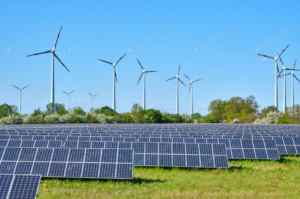What is a Solar Farm & How Do They Work?

The transition towards renewable energy is accelerating, and solar farms are at the forefront of this movement. These large-scale installations harness the power of the sun to generate clean, sustainable electricity, contributing significantly to the reduction of carbon emissions. But what exactly is a solar farm, and how do they work? In this blog, we’ll delve into the intricacies of solar farms, their operation, and the benefits they offer. Additionally, we’ll highlight the services provided by One Place Solar to support your solar energy projects.
Understanding Solar Farms
A solar farm, also known as a solar park or photovoltaic (PV) power station, is a large-scale photovoltaic system designed to supply power into the electricity grid. Unlike residential solar setups, which typically power individual homes, solar farms generate electricity on a much larger scale, feeding it directly into the grid to supply power to a broader community or even multiple regions.
Types of Solar Farms
Utility-Scale Solar Farms:
-
- These are large installations that produce electricity for the grid. They usually cover large areas of land and consist of thousands of solar panels. Utility-scale solar farms can produce anywhere from a few megawatts (MW) to hundreds of megawatts of power.
Community Solar Farms:
-
- These smaller-scale solar farms allow multiple community members to share the benefits of solar power without having to install panels on their property. Participants typically subscribe to a portion of the solar farm and receive credits on their electricity bills for the power generated.
How Do Solar Farms Work?
Solar Panel Installation:
-
- Solar panels, or modules, are installed in arrays across large tracts of land. These panels are typically made of silicon and convert sunlight into direct current (DC) electricity.
Inverters:
-
- The DC electricity produced by the solar panels is sent to inverters, which convert it into alternating current (AC) electricity. AC is the form of electricity used by homes and businesses and is compatible with the grid.
Connection to the Grid:
-
- The AC electricity is then fed into the electrical grid. From there, it is distributed to homes, businesses, and other end-users.
Monitoring and Maintenance:
-
- Solar farms require ongoing monitoring and maintenance to ensure optimal performance. This includes regular cleaning of the panels, checking connections, and ensuring the inverters are functioning correctly.
Benefits of Solar Farms
Renewable Energy:
-
- Solar farms generate clean, renewable energy, reducing reliance on fossil fuels and decreasing greenhouse gas emissions.
.Scalability:
-
- Solar farms can be scaled up or down depending on the available land and the energy needs of the region.
Economic Benefits:
-
- They create jobs in construction, maintenance, and operations. Additionally, solar farms can provide lease payments to landowners.
Energy Independence:
-
- By generating local power, solar farms can reduce dependence on imported energy and enhance energy security.
Services Provided by One Place Solar
At One Place Solar, we offer a comprehensive suite of services to support your solar energy projects, from conception to completion:
-
- Crafting compelling and detailed proposals to help you win projects and secure funding.
Solar Designing Services:
-
- Providing innovative and efficient designs tailored to your specific needs and site conditions.
-
- Ensuring that your designs meet all regulatory requirements and industry standards.
-
- Integrating solar solutions with telecommunications infrastructure for seamless energy and connectivity.
-
- Designing state-of-the-art electric vehicle charging stations to support the growing demand for EV infrastructure.
-
- Assisting with the permitting process to ensure your solar projects comply with local regulations.
Conclusion
Solar farms play a crucial role in the transition to renewable energy, providing clean power on a large scale and contributing to the reduction of carbon emissions. Whether you are looking to develop a utility-scale solar farm or a community solar project, understanding how these systems work and their benefits is essential.
At One Place Solar, we are committed to supporting your solar energy projects with our comprehensive range of services. From initial proposals and design to engineering stamps and permitting, we are here to help you every step of the way.
For more information or to discuss your solar project needs, contact us at:
Email: info@oneplacesolar.com
Phone: +1 209 682 5630
Embrace the power of solar energy with One Place Solar and contribute to a sustainable future.
